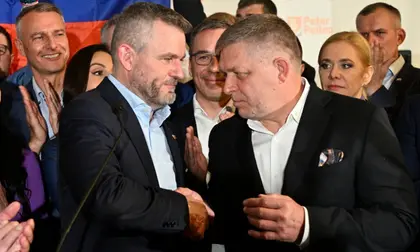Peter Pellegrini will be Slovakia's new president. The Social Democrat, who supports the Fico government's pro-Russian course, won the run-off election on Saturday with a lead of more than six percentage points against the candidate from the pro-Western liberal camp, Ivan Korčok. Europe's press fears the emergence of a new alliance.
Fear of being dragged into war successfully exploited
JOIN US ON TELEGRAM
Follow our coverage of the war on the @Kyivpost_official.
Pellegrini won the election by focusing on one key issue, Deník sums up:
“'I won't send a single Slovakian soldier to Ukraine', Pellegrini wrote on his billboards. ... All he needed was this incantation and the assurance that he will be 'a president of peace, not war'. ... Pro-Russian disinformation holds far more sway in Slovakia than in the Czech Republic. There is even a significant part of the population that supports the aggressor Russia rather than invaded Ukraine. That is why this simple slogan was enough.”
Slovaks drifting away from the Czechs
The fear of being dragged into the war is leading Slovakia further and further away from the Czech Republic, Denník N comments:
“We are moving closer to Hungary, where this narrative helped Orbán win the last parliamentary elections. The alliance of Slovakian and Hungarian nationalists highlights the fact that there is not a hint of genuine patriotism behind the alliance, and only a shared inclination towards authoritarianism. It shows that Hungary's legacy is historically more deeply rooted than the formative influence of the First Czechoslovak Republic [1918 to 1938] and the brief two years of joint democracy-building after the fall of the communist regime.”

Slovak PM Vows to Block Ukraine's NATO Membership, Calls to Restore Ties with Russia
New alliance on the horizon
Twenty years after joining the EU the country is once again turning eastwards, the Süddeutsche Zeitung fears:
“Turning towards anti-Nato rhetoric and admiration for Putin. The break with the Czech Republic, which had been happening in instalments since the left-wing populist Prime Minister Robert Fico took office for the fourth time in October, is now complete. There are now no partners in Bratislava for either the Czech government or the Czech president. Instead, the former Czech prime minister Andrej Babiš, a populist and wealthy entrepreneur, supported the future president. Babiš has good prospects of taking the government in Prague again in autumn 2025. A new alliance is in the offing, led by Viktor Orbán in Budapest.”
Hoping for a U-turn
Only Pellegrini can effect a turnaround and preserve democracy now, writes Új Szó:
“The die is cast. ... Fico's steamroller can roll on. They may soon occupy the Constitutional Court. ... Or will Pellegrini be able to bring about a U-turn like [Slovakia's first president] Michal Kováč, who served [the first freely elected prime minister] Mečiar for a while two decades ago? That's why he was elected head of state in parliament in the first place. But then he had the courage and character to oppose Mečiar and his dictatorial methods.”
Neither candidate a win for Russia
Political scientist Vadim Trukhachev analyses the election result from the Kremlin's perspective in Izvestia:
“Pellegrini is ideologically at odds with Prime Minister Fico. He fully supports the anti-Russian sanctions, for example. And although he also questions the need to provide Ukraine with free military aid, he is prepared to sell it weapons. He will therefore act as a counterweight to the prime minister - albeit to a much lesser extent than Korčok would have done. Because the most important result of the Slovakian presidential election was already clear to Russia in advance. Despite all the differences between 'right-wing' Korčok and 'left-wing' Pellegrini, they had one fundamental thing in common: both condemned Russian policy over the last decade.”
You can also highlight the text and press Ctrl + Enter






